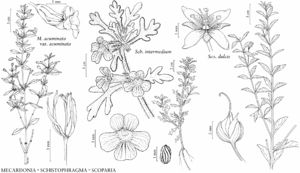Schistophragma intermedium
Notul. Nat. Acad. Nat. Sci. Philadelphia 43: 2. 1940. (as intermedia)
Stems simple or branching, 3–10(–15) cm. Leaves 2 per node; blade ovate to lanceolate, 10–20 × 3–10 mm, ultimate segments ovate to obovate. Pedicels ascending, 1–2(–4) mm in flower, 2–5(–7) mm in fruit, glabrous or glandular-villosulous. Flowers: calyx not falcate, abaxial lobe shorter than adaxial lobes, 2–4 × 0.3–0.5 mm, glabrous or glandular-villosulous; corolla glabrous, tube funnelform, 5–6 mm, throat open, pale yellow, lobes spreading, violet to purple, usually with darker lines, 1.5–2 × 1–2 mm; stamens included; style 2–2.5 mm. Capsules green or purple, ovoid, 4–6(–8) × 1.5–2.5 mm, slightly upcurved. Seeds shallowly reticulate, longitudinally spiraled. 2n = 40.
Phenology: Flowering Jul–Sep.
Habitat: Dry, sunny slopes and washes.
Elevation: 1000–2500 m.
Distribution
Ariz., N.Mex., Mexico (Chihuahua, Sonora).
Discussion
Schistophragma intermedium is closely related to Leucospora multifida, which has two or three (or four) leaves per node, corolla tubes 2–3 mm, and smaller fruits with obtuse or rounded apices. Schistophragma intermedium might be confused with species of Verbena due to the pinnatifid leaves and purple tubular corollas; the flowers of Schistophragma are solitary in leaf axils, and the corollas are bilabiate.
Selected References
None.
